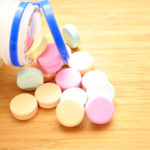By David Blyweiss, M.D., Advanced Natural Wellness
May 05, 2014
- The little-known cause of gas, bloating and indigestion
- How antacids and other common remedies may be doing more harm than good
- Say goodbye to gastrointestinal nightmares with 3 easy steps
I have patients who find themselves breezing through their day, when all of a sudden one poor decision results in a digestive disaster.
They eat something that sets off a gastrointestinal nightmare. Indigestion takes over, and for the rest of the day they’re burping, bloated, cramping and gassy. It can even affect their bowel movements… from one extreme to the other.
Sometimes they know exactly what it was that set these events off. If they’re lactose- or gluten-intolerant, the answer is pretty simple. If they’ve eaten a greasy meal, like pizza or a burger and fries, the answer is just as clear.
But what if you’re eating healthy foods – ones you should have a positive reaction to – and still have this problem frequently?
Well, don’t reach for that antacid just yet.
All of those antacids, proton pump inhibitors and H2 receptor antagonists might just be doing more harm than good.
MD Exposes the Hidden Danger to Your Eyes

When your eyesight starts to fail, it's a real problem. Suddenly you can't go to the grocery store... you can't get to the doctor if you have an emergency... you can't meet your friends for dinner…
Your "regular" doctor doesn't have time to keep up with the latest research. And the same goes for eye doctors. They go to school to learn how to fit you for glasses and contacts, but have no way of preventing the damage and loss of eyesight that threatens your freedom and independence.
Let me show you something that explains a LOT about how your eyes work.
In my FREE Special Report, I'll show you a HUGE, untapped resource for your eyes that safely and naturally restores clear, effortless eyesight.
Click here to get started...
It’s true they reduce hydrochloric acid (HCl) in the stomach. And this may make you feel better in the short-run. But here’s the thing…
HCl is a digestive juice that’s critical to proper digestion. It’s also essential for the activation of other digestive enzymes, like pepsin. If there’s not enough pepsin in your stomach, protein isn’t completely broken down. Other enzymes help break down carbohydrates and fats.
When these foods aren’t broken down, they end up fermenting in your gut. This produces gas that builds up and eventually leads to burping, bloating, heartburn and other digestive problems.
It might surprise you to learn that at least half of patients with heartburn – especially those over age 60 – don’t have enough stomach acid. So, taking an antacid is counterproductive. In the long run it actually makes the problem worse, not better.
There are much better ways to say goodbye to gastrointestinal distress, once and for all.
Here are three very effective and all-natural things you can do to get rid of gas, bloat, cramping, burping, diarrhea and constipation for good…
First is a very easy way to find out if you’re short on HCl. Next time you experience heartburn or an upset stomach, try taking a tablespoon of apple cider vinegar.
If the symptoms disappear, that’s a pretty good indication your body isn’t producing enough hydrochloric acid.
If that’s the case, just supplement with 600 mg. of betaine hydrochloride at the beginning of each meal. This digestive aid comes in capsule form and will help boost your levels of much-needed HCl to reduce after-meal symptoms.
Are You Suffering From...
- Love handles and a pot belly
- Romance that isn't what it used to
- Forgetfulness and inattention
- Low (or no) strength and endurance
- A sex drive that's shifted into neutral...or worse
If so...you may have Mature Male Burnout. Click here to discover more about this unique condition and what you can do about it.
Second is to restore a healthy balance of bacteria in your gut. You can do this by adding more fermented foods, such as yogurt, to your diet. These foods introduce plenty of good bacteria to the digestive tract to crowd out the bad ones. And they can really help a lot when it comes to reducing gassiness and cramping.
Now, when I say yogurt, I’m not talking about the kinds that are full of added sugar or artificial sweeteners. If you want to get any benefit at all from yogurt, stick with plain Greek yogurt that doesn’t have a bunch of sweeteners and other additives. Top it with fresh fruits and nuts to add flavor.
Other fermented food sources include miso, natto, kefir, kimchi, tempeh and unpasteurized sauerkraut.
Not crazy about these foods? Don’t worry. If you just can’t stomach them, try taking a probiotic supplement every day.
Look for one that contains multiple strains of lactobacillus and bifobacterium. It should also include a “prebiotic” to help the good bacteria survive the trip to the gut and intestines. This will help restore a healthy balance of gut bacteria to keep your digestive tract working smoothly.
Once your HCl production is under control and you’ve cleaned all the nasty bugs out of your digestive track, we have one more step. And it’s just as easy as the first two…
The third step to get rid of your gastrointestinal nightmares is to ramp up your digestive enzymes.
The best way to boost digestive enzymes is by eating more raw fruits and vegetables. And you probably eat a few of these healthy foods during the day already.
But when it comes to your veggies, chances are good you’re cooking most of them up to serve with a hot meal. What you may not realize is that heat destroys the enzymes in raw foods. All of the natural digestive benefits are lost.
What can you do?
Enjoy at least one meal a day of uncooked and unprocessed foods.
It’s easier than it sounds, because a lot of enzyme-rich produce is pretty tasty. Try raw papaya, pineapple, kiwi, parsley, kale, broccoli, apples, pears, strawberries and sprouted grains.
If you don’t feel you can get enough of these foods, you can also restore a natural acid and enzyme balance by supplementing with digestive enzymes. You’ll want to choose a formula that contains a good mix of enzymes, including…
• Amylase for carbohydrate digestion
• Protease to help digest proteins
• Lipase for the digestion of fats
• Maltase to convert complex sugars in grain foods to glucose
• Cellulase to break down fibers
• Sucrase to help digest sugars
I also like the idea of kicking enzyme activity into super-mode with a daily (organic, please!) green drink. The super foods used in these green drinks are loaded with natural plant-based enzymes. And they have plenty of power behind them.
Most of these powdered formulas include a healthy dose of chlorella, spirulina and wheat or barley grass in them. But I prefer one that includes plenty of fruit components, too – like acai, noni-fruit and agave – along with the greens.
Source:
Cater RE 2nd. “The clinical importance of hypochlorhydria (a consequence of chronic Helicobacter infection): its possible etiological role in mineral and amino acid malabsorption, depression, and other syndromes.” Med Hypotheses. 1992 Dec;39(4):375-83.
Marc Anthony R. Yago, et al. “Gastric Re-acidification with Betaine HCl in Healthy Volunteers with Rabeprazole-Induced Hypochlorhydria.” Mol Pharm. Nov 4, 2013; 10(11): 4032–4037.






